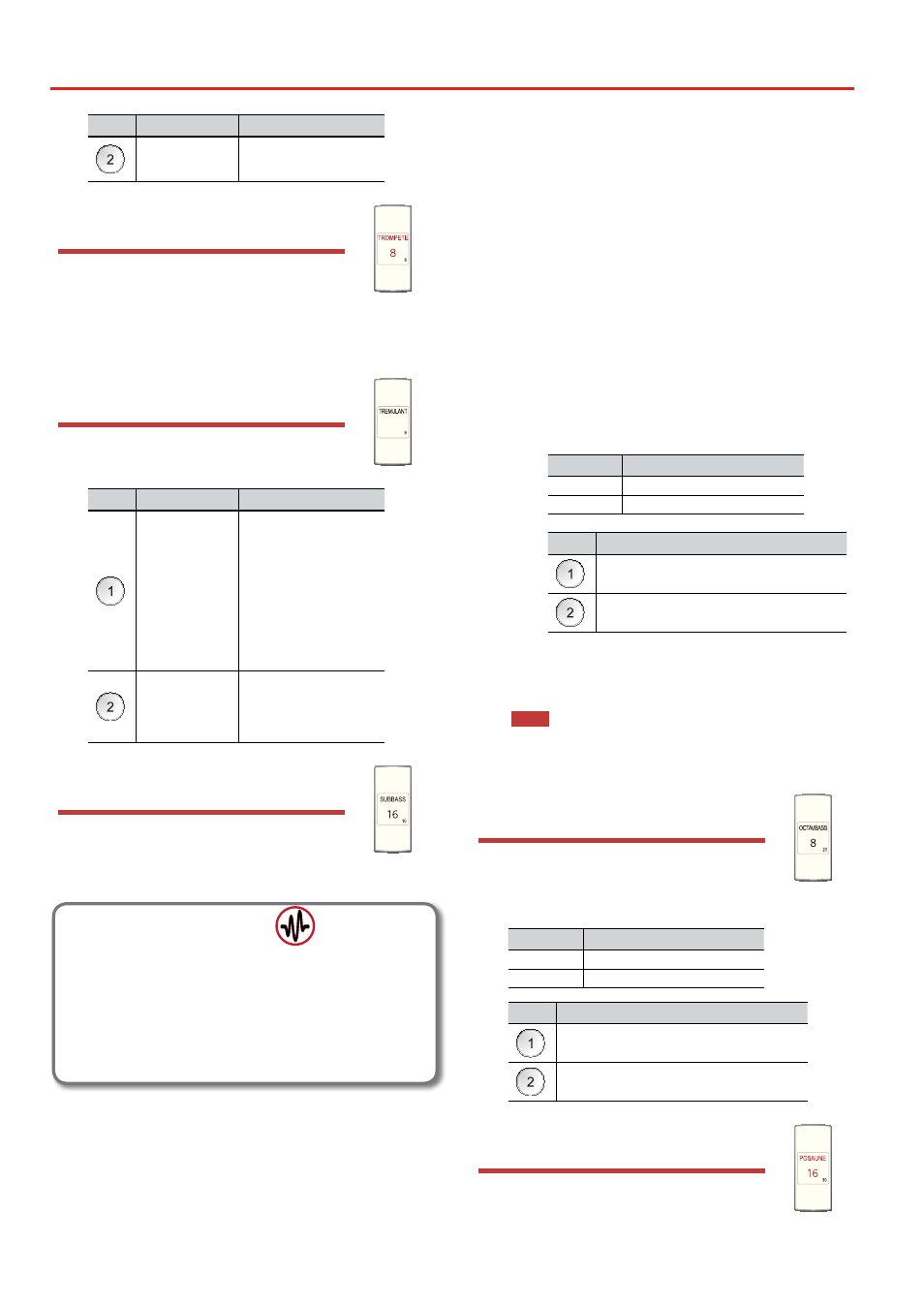Factory reset, Midi pedalboard, Importing organ sound set (user 1/2) – Dexibell CLASSICO L3 76-Organ User Manual
Page 44: Deleting organ sound set (user 1/2), Usb remove, Enable, Disable, Ee "importing organ sound, Set (user 1/2)" (p. 44), Enable disable

44
Advanced Functions
Piston
Setting
Explanation
ON
The Keyboard is connected to
the internal sound generator.
(DEFAULT)
Factory Reset
[
FUNCTION/EXIT
] button
8
This function allows you to recall the CLASSICO L3’s original factory
settings. Please see "Restoring the Factory Settings (Factory Reset)" (p.
MIDI PedalBoard
[
FUNCTION/EXIT
] button
9
Piston
Setting
Explanation
Enable
Select “
Enable
” if you
connect a MIDI PedalBoard
to the MIDI IN socket on the
CLASSICO L3's rear panel.
The PEDAL section is
played by the pedalboard.
See "Playing the PEDAL
(p. 22).
(DEFAULT)
Disable
Select “
Disable
” if you
connect another type of MIDI
device to the MIDI IN socket
on the CLASSICO L3's rear
panel.
Importing Organ Sound Set (User 1/2)
[
FUNCTION/EXIT
] button
10
The ORGAN [USER 1] and [USER 2] sets are only available after installing
optional new organ sound set into the CLASSICO L3.
Sound Set
The CLASSICO L3 gives you the possibility to install new organ sound
sets from:
DEXIBELL CLASSICO L3 Official Sounds (.DXS extension)
These sounds will be available and downloadable from the following
website:
http://www.dexibell.com/
Stay tuned for new sounds and updates by visiting our website regularly!
You can import User Sound Set in the internal memory of the
CLASSICO L3 and use them in your performances. To import you
need an USB Memory and your Personal computer.
Loading a organ sound set in the USB Memory
1.
Using your computer, download the Sound Set from the DEXIBELL web site
(.DXS).
2.
Insert the USB Memory into the USB port of your computer.
3.
Create two folders "/SOUND/ORGAN/USER1" and "/SOUND/ORGAN/USER2" in
the root of the USB Memory.
4.
Copy the Organ Sound Set (.DXS) into the USB Memory’s "/SOUND/ORGAN/
USER1" folder if you want to load them into "USER 1" location or "/SOUND/
ORGAN/USER2" folder for the "USER 2" location.
5.
Disconnect your USB Memory safely.
Importing the organ sound set
6.
Insert an USB Memory that contains Organ Sound Sets. See "Connecting an
USB Memory (commercially available)" (p. 18) .
7.
Enter in function mode selecting the [10] tilt tab. See "General procedure"
(p. 42).
The [10] tilt tab indicator lights steady.
8.
Press the appropriate piston:
The [1], [2] memory pistons indicate the possible choices:
Status
Explanation
Flashes
Empty (Free)
Lights steady
It contains a sound set
Piston
Explanation
Select “1” if you loaded the organ sound set in the "/
SOUND/ORGAN/USER1" folder.
Select “2” if you loaded the organ sound set in the "/
SOUND/ORGAN/USER2" folder.
The [10] tilt tab indicator flashes and at the end the sound set is imported.
To select the organ sound set imported please refer to "Selecting Various Organ
Types" (p. 21).
NOTE
When all tilt tabs are flashing they indicate an error during the import. If
this happens, please check the sound set file and the path in the Memory
USB.
Deleting Organ Sound Set (User 1/2)
[
FUNCTION/EXIT
] button
20
The [1], [2] memory pistons indicate the possible choices:
Status
Explanation
Flashes
It contains a sound set
Lights steady
Empty (Free)
Piston
Explanation
Select “1” to remove the USER 1 organ sound set.
Select “2” to remove the USER 2 organ sound set.
USB Remove
[
FUNCTION/EXIT
] button
30
Before unplugging the USB Memory, use this function to safely remove it.